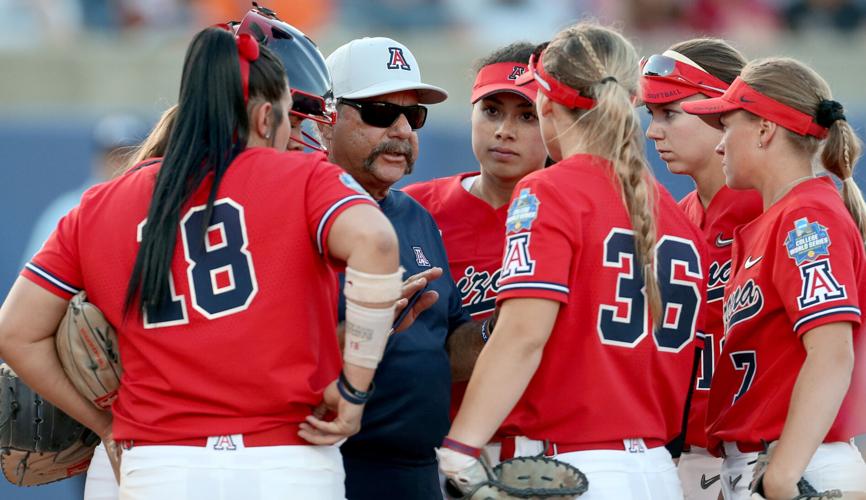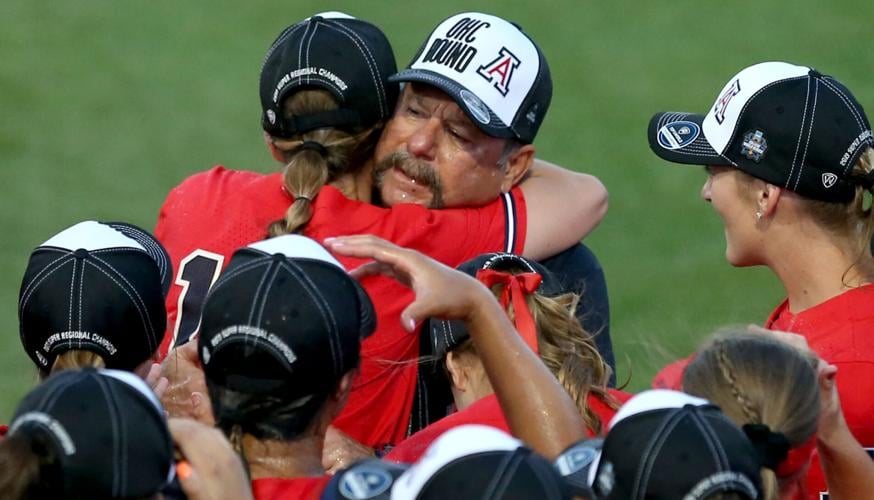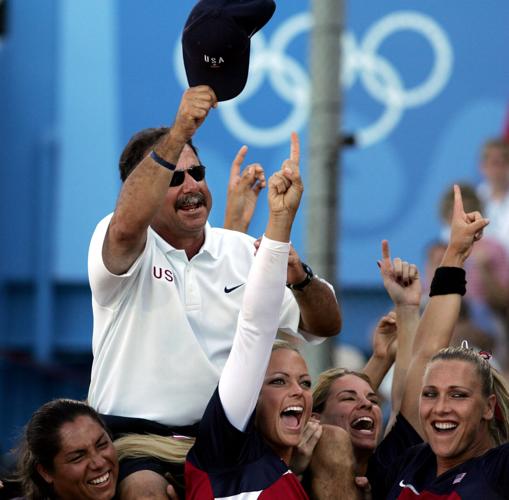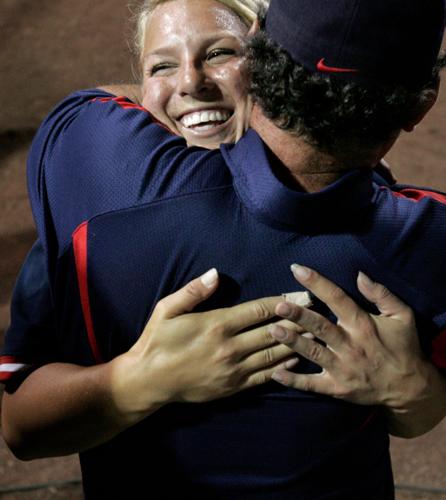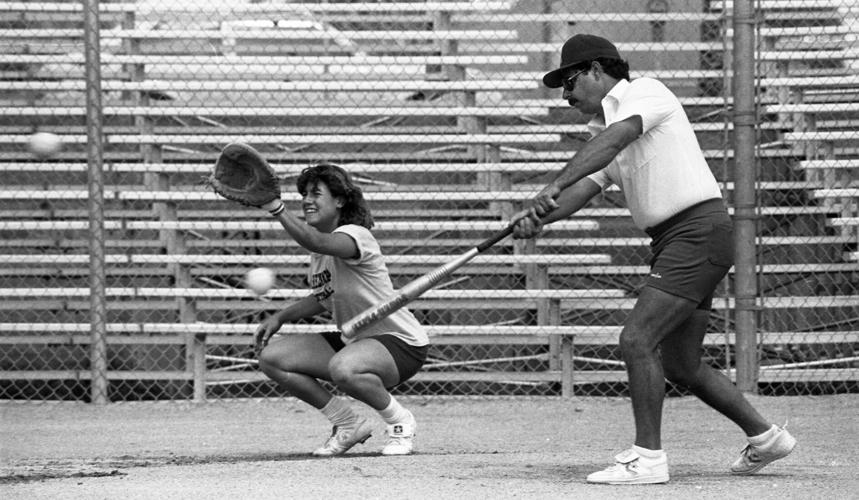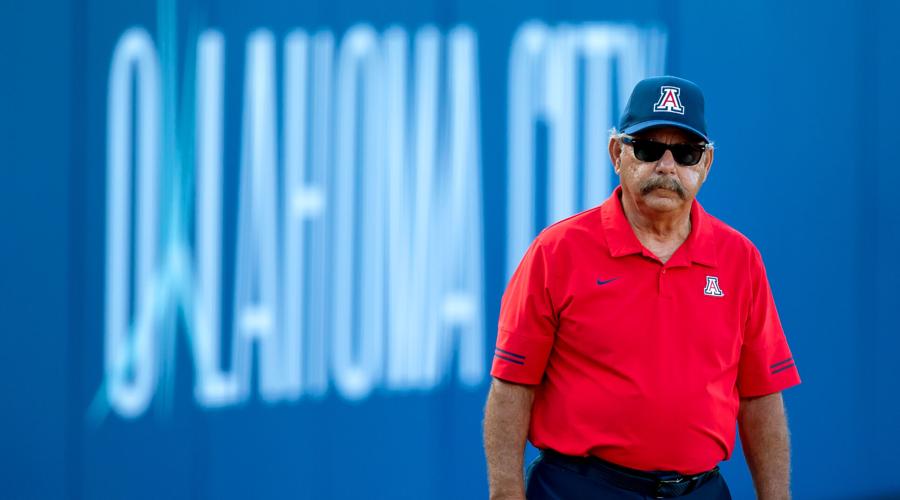The worst-kept secret in college softball is out.
Mike Candrea, college softball’s all-time winningest coach, announced Monday morning he will be retiring after 36 years, 1,674 wins, 24 Women’s College World Series appearances and a record eight national championships.
The man who once said he couldn’t see himself coaching past the age of 50 stayed at Arizona longer than Lute Olson and Dick Tomey. Among Arizona legends, only “Pop” McKale was a bigger fixture in the athletic department.
“It has been an honor to represent the University of Arizona for 36 years,” said Candrea, 65. “I am indebted to every player, coach and member of my support staff that has made the Arizona softball experience one that I will cherish forever. When I arrived in 1985, I wanted to build a culture of excellence and compete consistently at the highest levels of Division 1 softball. Most of all, our goal was to prepare our student-athletes for life after softball and build relationships that would last a lifetime.”
Legendary UA softball coach Mike Candrea announced in June 2021 that he is retiring after 36 seasons and a record 24 Women's College World Series appearances and eight national championships.
The UA announced Monday afternoon that Caitlin Lowe, the UA’s associate head coach and a former standout Wildcats player, will succeed Candrea. Candrea said Lowe, 36, “has been a superstar her entire life,” from her college days to serving as captain of the United States Olympic Team and playing professionally.
“She is bright, a good communicator, understands what it takes having been there as an athlete, and the players love her,” Candrea said. “Without a doubt, Caitlin is the best person to continue the Arizona legacy into the future. She will be a superstar for many years to come.”
Lowe said: “I could not have asked for a better mentor in this game and most importantly in life. I take great pride in carrying on the tradition of what it means to be an Arizona Wildcat.”
Speculation about Candrea’s pending retirement began last winter, though the coach was loath to talk about his future near the end of the regular season and in the playoffs. Tears flowed when the Wildcats won the NCAA Regionals — their final game of the year in Hillenbrand Stadium — and players posted signs about winning “for coach” at the Super Regionals in Fayetteville, Arkansas.
The Wildcats’ trip to Oklahoma City for the Women’s College World Series was a celebration of Candrea’s contributions to the game. Fans stood and cheered in the moments after Arizona was eliminated by Florida State on Saturday, knowing what the moment likely meant. Pressed about his future following the game, Candrea said he preferred to keep the focus on Arizona’s players. He has long called his “super senior” class “the gold standard.” On the nation’s largest stage, Candrea would not do anything to steal their shine.

Arizona softball coach Mike Candrea with senior catcher Karen Koebensky during practice in 1988.
‘We started at bottom’
The UA hired Candrea away from Central Arizona College on Aug. 25, 1985, then tasked the ASU grad to build a program that had played just four home games the previous season. The Wildcats played at Gittings Field, a longtime spot for physical education classes. They went 27-13-1 in Candrea’s first year — the worst single-season mark of his career.
“We started at bottom,” Candrea told the Star’s Greg Hansen in 2011.
By Year 3, Candrea’s Cats had qualified for the Women’s College World Series. Three years after that, the UA beat UCLA to win its first national championship in 1991.
More titles came, with Arizona winning the WCWS title in 1993, ‘94, ‘96, ‘97, 2001, ‘06 and ‘07. The Wildcats moved into the brand-new Rita Hillenbrand Stadium, which became a palace of the sport in the 1990s.
From 2000 to 2002, Arizona won 70 consecutive home games. They built a 45-game win streak from 1996 to 1998.
Candrea stayed at the UA long enough to see the ballpark built, twice. The UA razed and rebuilt “Rita” in 2019 with hopes of keeping up with renovations throughout college softball, and it’s again one of the sport’s top venues. The Wildcats made the WCWS that year, their first trip to Oklahoma City in a decade. They were ranked in the top five and poised to return in 2020 before the season was cut short because of the coronavirus pandemic. The Wildcats’ seven “super seniors” chose to return when given an extra year of eligibility by the NCAA — and so, too, did Candrea.
Candrea was under contract through 2022 as part of a deal that paid him $345,000 annually plus performance bonuses and 50,000 units in a master limited partnership. He had not pursued an extension.
Athletic director Dave Heeke called Candrea “one of the most iconic coaches, of any sport, in college athletics history.” UA athletic director Dave Heeke said Monday.
“While his impact on the game is widely recognized, his legacy is in the lives of the thousands of Wildcats who he coached. Mike’s career embodied true excellence in all facets of leading a softball program — winning on the field, student-athlete success in the classroom and developing them for life after graduation. He established a championship culture within Arizona Athletics that permeates throughout our department, and represented our state with honor and distinction.”
Candrea is a 2017 inductee into the National Softball Hall of Fame. He’s also a part of the Pima County Sports Hall of Fame, the Central Arizona College Hall of Fame, Arizona Sports Hall of Fame and NFCA Hall of Fame.

Pitcher Taryne Mowatt hugs coach Mike Candrea after Arizona beat Tennessee in Game 2 of the 2007 Women's College World Series in Oklahoma City.
Iconic players
Arizona’s championships were won on the backs of iconic players, none more popular than towering right-hander Jennie Finch — who, thanks to her dominance and television coverage of the Women’s College World Series, became softball’s biggest crossover star.
Finch, who wore No. 27 during her UA career, is one of five players to have her number retired by the UA, joining Jenny Dalton-Hill (No. 16), Julie Reitan (No. 10), Nancy Evans (No. 13) and Susie Parra (No. 1). Candrea’s final team included Jessie Harper, whose 92 career home runs are tied with former teammate Katiyana Mauga for second-most in college softball history; Dejah Mulipola, who is headed for this summer’s Olympics as Team USA’s catcher; and Alyssa Palomino-Cardoza, who, at 24, put off joining the pro ranks for one more year in the sun.
Mulipola was named a first-team NFCA All-American last week. She joins a long list of Candrea-coached players who have carried on his legacy throughout college athletics, both on and off the field.
Consider: UA executive senior associate athletic director Erika Hanson Barnes is a former Wildcats player. Candrea’s successor, Lowe, was a four-time All-American and one-time Olympic gold medalist who was voted — unanimously — as the greatest college center fielder of all time. The UA’s Super Regional win over Arkansas was called on ESPN by Dalton-Hill, a former national Player of the Year who ranks among the best in program history. Former WCWS star Taryne Mowatt-McKinney is Arizona’s pitching coach.
Finch and other former Wildcats traveled to Oklahoma City for this year’s WCWS, knowing that it might be Candrea’s final run. Asked on ESPN what her former coach meant to her, Finch teared up.
“We’re just so thankful for who he is and what he’s done, and he’s done it the right way,” Finch said. “We love him so dearly, and we’re so thankful for the man that he is.”
She said Candrea remains “a second father to us all.”
Candrea said much the same thing following Saturday’s elimination. At a time when he could have rocked the softball world by announcing his retirement or reminded fans of his accomplishments, he instead spoke about the connection he shares with his current and former players.
Candrea keeps a list of all his former players’ birthdays in his planner; he said he tries to remember each of them on their special day.
“The one thing that I’ve always wanted to do is make it a family — I try to treat it like a family,” he said. “When I see all of them, that’s our family.”

Mike Candrea trots onto the field with his Wildcats for pre-game fielding drills before a game against South Dakota at Hillenbrand Stadium in 2018.
Coaching tree
Arizona’s decision to stay in-house for Candrea’s replacement was a no-brainer. After all, Candrea’s coaching tree branches far and wide.
Lowe is viewed as one of the brightest young minds in the game. Mowatt-McKinney has been the pitching coach at Ole Miss and the UA. Stacy Iveson, a former head coach at Pima College and Yavapai College and a onetime UA assistant, is the Wildcats’ director of recruiting and operations.
Ex-Cat Kristie Fox is the head coach at UNLV. Debby Day is the head coach at Cal Lutheran. Bekah Quiroz runs Pima College’s program.
Lisa Bernstein and Julie Standering were co-head coaches at Minnesota, and Lety Pineda-Boutte won more than 350 games at Washington University in St. Louis.
Candrea’s own family has its share of softball coaching success. His brother, Nick, is the longtime head softball coach at Paradise Valley Community College, switching to the sport — as Mike did — after coaching baseball. Mike Candrea’s son, Mikel, is a sought-after hitting instructor. Both have been mainstays at Candrea’s summer camps in Tucson.

Mike Candrea rides on the shoulders of American players including former UA All-American Jennie Finch, center, after winning the 2004 Olympic title game. Candrea, who took a year off from coaching the UA to guide the U.S. women, lost his wife, Sue, in July after complications from a brain aneurysm.
Olympic success and personal tragedy
Tragedy struck in July 2004, when Candrea’s wife of 28 years, Sue, died just 10 days before the start of the Summer Olympics in Athens. With the blessing of his son Mikel and daughter Michelle, Candrea coached Team USA to a gold medal. The Americans outscored their opponents 51-1 over nine games.
He returned to Team USA in 2008, leading the Americans to a silver medal in Beijing. In April, the Italian national team announced that it had tabbed Candrea as a special advisor ahead of this summer’s Olympics. At the time, he called it “a great opportunity to repay the game of softball for all the good things it has given me in the last 40 years” and a way to both honor his Italian roots and the memory of skipper Enrico Obletter, who died of complications from COVID-19 in February.
Candrea found personal happiness again. He married Tina Tilton at the Westin La Paloma Resort and Spa in 2006. Around that time, he moved to Tucson after decades of commuting daily to The Old Pueblo from Casa Grande. Candrea is stepdad to Tilton’s two sons, Ryan and Sean.

Mike Candrea watches Arizona play against Alabama during Thursday's Women's College World Series opener in Oklahoma City. He led the Wildcats to 24 WCWS appearances in his career.
Going out on top
A plain-spoken truth-teller, Candrea developed fierce loyalty among his players, assistant coaches and staffers as well as Wildcats fans. The coach was superstitious, often seeing signs of future success in things like hotel room numbers and receipts.
In a profession where it’s easy to become jaded, Candrea prided himself on supporting the Wildcats’ other sports programs. He’s a sports fan at heart: His collection of New York Yankees memorabilia is a tribute to the teams of his childhood.
Candrea’s Arizona teams established traditions that have become iconic within the sport, be it the playing of Linda Ronstadt’s “Palomita de Ojos Negros,” the call of “Juegan Pelota“ (“Play ball!) before games or the script “Arizona” on the Wildcats jerseys.
Candrea could be tough on his players, but he was quick with a hug or a word of encouragement when needed.
As he aged, Candrea found himself savoring the things that he may have taken for granted in the past. The Wildcats’ 2019 return to Oklahoma City after a 10-year hiatus was special for the veteran coach. And he became especially emotional following this year’s Arizona’s NCAA Regional championship at Hillenbrand Stadium. Pressed about whether his emotions were the sign of something else — potentially retirement — Candrea said instead that he had learned to enjoy the moment.
In fact, in the moments following Saturday’s elimination-game loss to Florida State — his final game as Arizona’s coach — it was Candrea who consoled his players. Not the other way around.
“It’s not life-threatening,” he said of the loss. “It feels life-threatening when you’re going through it, but at the end of the day I was proud of the job they did to get us here.”
Photos: University of Arizona softball coach Mike Candrea, who announced his retirement
Mike Candrea, retirement
Updated
Coach Mike Candrea takes a moment to gather his thoughts a press conference at McKale Center on June 8, 2021.
Mike Candrea, retirement
Updated
Coach Mike Candrea talks with two former players, K'Lee Arredondo, left, and Cyndi Duran, before start of his retirement press conference at McKale Center on June 8, 2021.
Mike Candrea, Arizona softball
Updated
Arizona Head Coach Mike Candrea walks with the wildcats in a huddle after Arizona's loss to Florida State in 2021 Women's College World Series in Oklahoma City on June 5, 2021.
Mike Candrea, Arizona softball
Updated
Arizona softball coach Mike Candrea with senior catcher Karen Koebensky during practice in 1988.
Mike Candrea, Arizona softball
Updated
University of Arizona softball coach Mike Candrea during practice in 1988.
Mike Candrea, Arizona softball
Updated
Athletic director Jim Livengood, right, introduces University of Arizona softball coach Mike Candrea during a ceremony honoring the team's fourth NCAA National Championship at Hillenbrand Stadium on May 28, 1996.
Mike Candrea, Arizona softball
Updated
Legendary University of Arizona baseball coach Jerry Kindall greets his equal in University of Arizona softball coach Mike Candrea during a ceremony honoring the team's fourth NCAA National Championship at Hillenbrand Stadium on May 28, 1996.
Mike Candrea, Arizona softball
Updated
UA softball head coach Mike Candrea (left) and UA golf head coach Todd McCorkle were both vying for national championships in 2000.
Mike Candrea, Arizona softball
Updated
Coach Mike Candrea consoles Leticia "Lety" Pineda after a tough loss to Fresno State in the College World Series in 1998.
Mike Candrea, Arizona softball
Updated
Coach Mike Candrea with Jennie Finch, Caitlin Lowe, Chelsie Mesa and Taryne Mowatt following a game between the National Pro Fastpitch All-Stars team and the Wildcat softball team at Hillenbrand Stadium in 2010.
Mike Candrea, Arizona softball
Updated
University of Arizona coach Mike Candrea hugs senior Samantha Quintero during a special senior recognition ceremony after the game against Oregon State on at Hillenbrand Stadium in 2004,.
Mike Candrea, Arizona softball
Updated
Coach Mike Candrea hits grounders to the infielders and pitchers including Jennie Fench during the 2000 Women's College World Series.
Mike Candrea, Arizona softball
Updated
UA coach Mike Candrea talks to Toni Mascarenas after Arizona lost to the Oklahoma Sooners and were eliminated from the 2000 Women's College World Series.
Mike Candrea, Arizona softball
Updated
Arizona coach Mike Candrea is showered with water Monday, May 28, 2001, after his team defeated UCLA, 1-0, in the NCAA Division I Softball championship game in Oklahoma City.
Mike Candrea, Arizona softball
Updated
Arizona softball head coach Mike Candrea, right, talks with left fielder Autumn Champion during the fourth inning against Tulsa at Hillenbrand Stadium in 2005.
Mike Candrea, Arizona softball
Updated
Coach Mike Candrea talks with an NCAA official about a questionable call at first base that ended the game 1-0 in favor of Tennessee in the 2006 College World Series in Oklahoma City.
Mike Candrea, Arizona softball
Updated
Pitcher Taryne Mowatt hugs coach Mike Candrea after Arizona beat Tennessee in Game 2 of the 2007 Women's College World Series in Oklahoma City.
Mike Candrea, Arizona softball
Updated
Arizona head coach Mike Candrea shares a few words with pitcher, Kenzie Fowler after the Wildcats beat Tennessee 5-2 to advance to the championship finals at the 2010 Women's College World Series in Oklahoma City.
Mike Candrea, Arizona softball
Updated
Head coach Mike Candrea cheers with his team after they beat Tennessee in game 3 of the championship series at the 2007 College World Series held in Oklahoma City.
Mike Candrea, Arizona softball
Updated
Mike Candrea rides on the shoulders of American players including former UA All-American Jennie Finch, center, after winning the 2004 Olympic title game. Candrea, who took a year off from coaching the UA to guide the U.S. women, lost his wife, Sue, in July after complications from a brain aneurysm.
Mike Candrea, Arizona softball
Updated
Mike Candrea chats with Sarah Akamine at the end of the fifth inning during the championship game against UCLA at the 2010 Women's College World Series in Oklahoma City.
Mike Candrea, Arizona softball
Updated
Coach Mike Candrea tosses grounders to infielders during the first day of practice on January 12, 2009 at Hillenbrand Stadium.
Mike Candrea, Arizona softball
Updated
UA softball coach Mike Candrea, with wife Tina, keeps track during selection day of where his team will be placed for the first round of the 2012 NCAA Softball Tournament.
Mike Candrea, Arizona softball
Updated
Arizona's heas coach Mike Candrea kisses injured pitcher Sarah Akamine during 2010 senior day.
Mike Candrea, Arizona softball
Updated
Head coach Mike Candrea argues with an NCAA softball official after Caitlin Lowe was called out at second trying to steal against Mississippi State in the 2007 NCAA Regionals at Hillenbrand Stadium.
Mike Candrea, Arizona softball
Updated
Coach Mike Candrea watches as Kristie Fox slides safely into third for a triple as Oregon State University third base Sherina Galvan waits for the ball in 2007.
Mike Candrea, Arizona softball
Updated
UCLA coach Sue Enquist is cracking-up as she is answering questions about funny things that happened to her and her team this year as UA coach Mike Candrea smiles during a Q&A session at the 2003 Women's College World Series.
Mike Candrea, Arizona softball
Updated
Mike Candrea talks with starting pitcher Shelby Babcock in between innings against Arizona State at Hillenbrand Stadium in 2011.
Mike Candrea, Arizona softball
Updated
Arizona head coach Mike Candrea takes a moment to think during the first game of the 2005 NCAA Women's College World Series in Oklahoma City.
Mike Candrea, Arizona softball
Updated
Mike Candrea takes a moment to gather his thoughts before talking to his team after a loss to Arizona State at Hillenbrand Stadium in 2011.
Mike Candrea, Arizona softball
Updated
UA first baseman Baillie Kirker is congratulated by Mike Candrea after a two-run homer in an NCAA Regional game against Texas Tech in 2011.
Mike Candrea, Arizona softball
Updated
UA head coach Mike Candrea isn't happy with his team in the top of the third inning against Oklahoma in the 2011 NCAA Super Regional at Hillenbrand Stadium.
Mike Candrea, Arizona softball
Updated
A silk rose is placed behing home plate at Hillenbrand Stadium in 2006 in honor of head coach Mike Candrea's wife, who died of cancer.
Mike Candrea, Arizona softball
Updated
Arizona head coach Mike Candrea has a hard time finding the words as he tries to talk to his team following their loss to Oklahoma 5-2 in the 2011 NCAA Super Regional game. This was only Arizona's second time in 24 years to not advance to the College World Series.
Mike Candrea, Arizona softball
Updated
UA softball head coach Mike Candrea leans down and kisses the cheek of his shortstop player Michelle Churnock as she lies on a stretcher after breaking her leg in a double play situation against South Florida in 1999.
Mike Candrea, Arizona softball
Updated
Head coach Mike Candrea watches his players batting during a practice at Hillenbrand Stadium on January 23, 2020.
Mike Candrea, Arizona softball
Updated
Head coach Mike Candrea gets his players to smile during warm-ups at the University of Arizona Wildcats softball practice at Hillenbrand Stadium in 2017,
Mike Candrea, Arizona softball
Updated
Head coach Mike Candrea hits fungo to outfielders during the University of Arizona Wildcats softball practice at Hillenbrand Stadium in 2017.
Mike Candrea, Arizona softball
Updated
Arizona coach Mike Candrea reacts after Arizona outfielder Mandie Perez (55) got hung up between bases and thrown out a third against Southern Utah in the bottom of the fourth inning of the opener of both the Hillenbrand Invitational and the Wildcats season at Hillenbrand Stadium in 2016.
Mike Candrea, Arizona softball
Updated
Arizona shortstop Kellie Fox (29) fist bumps head coach Mike Candrea as she rounds third after a first-inning home run during the University of Arizona vs. UTEP softball game in 2014.
Mike Candrea, Arizona softball
Updated
Arizona's Hannah Martinez (2) gets a congratulatory fist bump from coach Mike Candrea after lacing a two-RBI triple against Kent State in the fourth inning of their game in the Wildcat Invitational at Hillenbrand Stadium in 2019.
Mike Candrea, Arizona softball
Updated
Cedric Dempsey, left, the former University of Arizona athletic director has a laugh with UA softball coach Mike Candrea as they await the introduction of Dave Heeke as the athletic director in 2017.
Mike Candrea, Arizona softball
Updated
Mike Candrea trots onto the field with his Wildcats for pre-game fielding drills before a game against South Dakota at Hillenbrand Stadium in 2018.
Mike Candrea, Arizona softball
Updated
Arizona Mike Candrea talks with starting pitcher Taylor McQuillin (18) after the Wildcats gave up three runs to New Mexico State in the sixth inning of their game at Hillenbrand Stadium in 2018.
Mike Candrea, Arizona softball
Updated
Arizona head coach Mike Candrea unsuccessfully tries to will Katiyana Mauga back to the bag ahead of the tag by Oregon third baseman Jenna Lilley (0) after she overran the bag at Hillenbrand Stadium in 2017.
Mike Candrea, Arizona softball
Updated
Arizona coach Mike Candrea watches a batter during their Pac-12 game against UCLA at Hillenbrand Stadium in 2016.
Mike Candrea, Arizona softball
Updated
Arizona Mike Candrea sprays ground balls to his infielders as the Wildcats prepare to face Oregon State at Hillenbrand Stadium in 2016,
Mike Candrea, Arizona softball
Updated
Arizona outfielder Katiyana Mauga bumps fists with head coach Mike Candrea as she rounds the bases following a three-run homer during the first inning of the University of Oregon vs. University of Arizona Wildcats in 2015.
Mike Candrea, Arizona softball
Updated
Coach Mike Candrea kisses softball stand out Katiyana Mauga, the school's record setting hitter, during the first-ever University of Arizona student-athlete convocation in Tucson on May 11, 2017. Around 95 students received their degrees with all the pomp and circumstance inside the McKale Center in front of family and friends.
Mike Candrea, Arizona softball
Updated
Arizona's coach Mike Candrea watches as Chelsea Suitos slides safely into third as Minnesota's Sam Macken catches the ball in the first inning during second game of the NCAA regional championship game at Hillenbrand Stadium in 2015.
Mike Candrea, Arizona softball
Updated
Arizona third baseman Katiyana Mauga (34) exchanges high-fives with head coach Mike Candrea after ripping a solo homer to put the Wildcats up 1-0 against South Carolina in the third inning of their NCAA Regional game at Hillenbrand Stadium in 2017.
Mike Candrea, Arizona softball
Updated
Arizona head coach Mike Candrea reloads to hit another ground ball while working out his infielder just before first pitch against South Carolina in their NCAA Regional championship game at Hillenbrand Stadium in 2017.
Mike Candrea, Arizona softball
Updated
Former Arizona Wildcat Jennie Finch says Candrea remains “a second father to us all.”
Mike Candrea, Arizona softball
Updated
Arizona softball coach Mike Candrea meets coach Clint Myers at the fence in Auburn, Ala., in 2016.
Mike Candrea, Arizona softball
Updated
Arizona's head coach Mike Candrea listens from dais during a press conference the day before the games start in the NCAA Women's College World Series, Wednesday, May 29, 2019, Oklahoma City, Okla.
Mike Candrea, Arizona softball
Updated
Arizona's head coach Mike Candrea tracks the game from his perch at the end of the Wildcats bench against Washington in their first round game on the opening day of play in the 2019 NCAA Women's College World Series.
Mike Candrea, Arizona softball
Updated
Arizona's head coach Mike Candrea meets his infield in the circle as the Wildcats try to stem the bleeding in wild top half of the the seventh inning that ended with them down 6-1 to UCLA in their winner's bracket game on day two of the 2019 NCAA Women's College World Series.
Mike Candrea, Arizona softball
Updated
Players cheer as Arizona head coach Mike Candrea dances during a rain delay in their NCAA softball regional game against Ohio State Friday, May 20, 2016 in Knoxville, Tennessee. The game was called due to inclement weather.
Mike Candrea, Arizona softball
Updated
Arizona's players gather around head coach Mike Candrea just before taking the field against Mississippi in Game 2 of the NCAA Super Regional at Hillenbrand Stadium, May 25, 2019.
Mike Candrea, Arizona softball
Updated
Arizona head coach Mike Candrea watches his Wildcats warm up in the final moments before first pitch against New Mexico State at Hillenbrand Stadium, Tucson, Ariz., April 9 2021.


